Why do you consider democracy a failure? Under what circumstances would it work? I've seen a lot of people disparage democracy here, but have never really seen a reason as to why.
/mlpol/ - My Little Politics
Archived thread
Democracy works best under the circumstances by which it was invented: in homogeneous city-states where the entire voting population consists of informed, educated individuals.
>>228858
1. It fails to act fast enough to emerging probles.
e.g. Legislation for IVF or Social Media
2. It becomes entrenched with idea.
e.g. Giving 0.7% of GDP to poor countries even though it has not worked.
3. It subjigates odd ideas.
e.g. buggery
Democracy fails most because people have the perception of control when in fact it makes fuck all difference to those with the power. If those in power are good people then all is well but if they are not then just like any other form of governance people suffer.
A good dictatorship is better than a drunken democracy.
1. It fails to act fast enough to emerging probles.
e.g. Legislation for IVF or Social Media
2. It becomes entrenched with idea.
e.g. Giving 0.7% of GDP to poor countries even though it has not worked.
3. It subjigates odd ideas.
e.g. buggery
Democracy fails most because people have the perception of control when in fact it makes fuck all difference to those with the power. If those in power are good people then all is well but if they are not then just like any other form of governance people suffer.
A good dictatorship is better than a drunken democracy.
>There is the erasure of a sense of distinguishment between subjects and rulers
Since entry to government is very open under democracies or republics, (in opposition to a monarchic system in which it is almost impossible to join the political class,) there is an illusion that the state is indistinguishable from those it rules over, and whatever the state does to the citizenry, the citizens are in fact doing to themselves, so people are naturally less likely to resist any despotic action undertaken by the state.
>Politicians have no reason to exercise any kind of responsibility in governance.
While the king wants to preserve the prosperity of his kingdom so that his heir will be able to tax more wealth from it in the future, a democratic politician has no such concerns, and will spend, tax, and inflate to his heart's content.
>Social trust is diminished through democracy
Citizens suspect their neighbor might vote for a politician who will plunder the former to give to the latter, so they feel compelled to vote for a politician who promises to plunder on their behalf rather than to their detriment.
Since entry to government is very open under democracies or republics, (in opposition to a monarchic system in which it is almost impossible to join the political class,) there is an illusion that the state is indistinguishable from those it rules over, and whatever the state does to the citizenry, the citizens are in fact doing to themselves, so people are naturally less likely to resist any despotic action undertaken by the state.
>Politicians have no reason to exercise any kind of responsibility in governance.
While the king wants to preserve the prosperity of his kingdom so that his heir will be able to tax more wealth from it in the future, a democratic politician has no such concerns, and will spend, tax, and inflate to his heart's content.
>Social trust is diminished through democracy
Citizens suspect their neighbor might vote for a politician who will plunder the former to give to the latter, so they feel compelled to vote for a politician who promises to plunder on their behalf rather than to their detriment.
>>228858
A quick explanation would be the Caesar's speech from Fallout New Vegas.
In short: the system has corrupted itself over time.
>People with different ideas collide, and the almost 50-50 radio doesn't help.
>Bureocracy has made lots of simple tasks into a myriad of papers and regulations, made more to block the person than help him.
>Governors fight more for popularity than for the actual good of the country.
>Keeping on governors, some are hoarders of gold and power, seeking more their personal wealth than the good sake of their people, even to the point of letting them get more hungry and stupidier so they die fighting each other for basic needs.
>Short mandates leaves a lot of unfinished work. Not much presidents can say they made impactful movements; and when the movement was the wrong one, the next guy is more busy fixing it.
I don't say "throw away the system!", all I ask is give other ideas a chance. Maybe one will work.
A quick explanation would be the Caesar's speech from Fallout New Vegas.
In short: the system has corrupted itself over time.
>People with different ideas collide, and the almost 50-50 radio doesn't help.
>Bureocracy has made lots of simple tasks into a myriad of papers and regulations, made more to block the person than help him.
>Governors fight more for popularity than for the actual good of the country.
>Keeping on governors, some are hoarders of gold and power, seeking more their personal wealth than the good sake of their people, even to the point of letting them get more hungry and stupidier so they die fighting each other for basic needs.
>Short mandates leaves a lot of unfinished work. Not much presidents can say they made impactful movements; and when the movement was the wrong one, the next guy is more busy fixing it.
I don't say "throw away the system!", all I ask is give other ideas a chance. Maybe one will work.
>>228858
>Why do you consider democracy a failure?
Because women and niggers have the right to vote.
>Under what circumstances would it work?
It could work even with niggers and women voting IF you could put some sort of test on those voting. I'd be thrilled if you just had to prove you have $10K in assets to vote. That basically means you could survive 6 or more months of unemployment without being a drag on the system, and that you have enough self-control to not spend every dollar on sneakers and pot. The US would be a completely different place.
>Why do you consider democracy a failure?
Because women and niggers have the right to vote.
>Under what circumstances would it work?
It could work even with niggers and women voting IF you could put some sort of test on those voting. I'd be thrilled if you just had to prove you have $10K in assets to vote. That basically means you could survive 6 or more months of unemployment without being a drag on the system, and that you have enough self-control to not spend every dollar on sneakers and pot. The US would be a completely different place.
Democracy is not rule of the people. It is rule by those that control the narrative. The press, think tanks, and the people that fund them are the people who truly run a democracy.
>>228880
Original Democracy did not include women, slaves or the middle class. It is really only in the last 50 years that has changed.
Original Democracy did not include women, slaves or the middle class. It is really only in the last 50 years that has changed.
1561963578.jpg (33.6 KB, 300x391, CB4BEF8D-CC83-425F-A301-43FA04C021BE.jpeg)

Democracy rewards popular ideas instead of good ideas. Even in a homogenous society where only educated, employed, tax paying males who own property could vote, it would still be consensus rule which always tends to drag things down to the lowest common denominator.
The main argument in favor of it is that “the people” should have a say in the decisions that affect their lives. The problem with this though is that even intelligent, well bred people don’t always understand the complexities of politics or economics well enough to make informed decisions, so democracy usually ends up becoming some sort of representative system like the ones that most modern nations have. What you usually end up with in that situation is what we have: a huge, complex bureaucracy governed by career politicians who do whatever they have to do to win votes while advancing their own personal agenda.
A much simpler, much better system is to just have a monarch who inherits power by right and is raised from birth to understand statecraft and to think in terms of what’s best for the nation. Worst case scenario you get the occasional bad king who needs to be deposed and replaced with someone better. Compare that to our current system, where “checks and balances” have created an impossibly complex webwork of corruption that is proving almost impossible to repair from within.
The main argument in favor of it is that “the people” should have a say in the decisions that affect their lives. The problem with this though is that even intelligent, well bred people don’t always understand the complexities of politics or economics well enough to make informed decisions, so democracy usually ends up becoming some sort of representative system like the ones that most modern nations have. What you usually end up with in that situation is what we have: a huge, complex bureaucracy governed by career politicians who do whatever they have to do to win votes while advancing their own personal agenda.
A much simpler, much better system is to just have a monarch who inherits power by right and is raised from birth to understand statecraft and to think in terms of what’s best for the nation. Worst case scenario you get the occasional bad king who needs to be deposed and replaced with someone better. Compare that to our current system, where “checks and balances” have created an impossibly complex webwork of corruption that is proving almost impossible to repair from within.
>>228858
Most people conflate the term "Democracy" with many other things such as Individualism, Freedom, Justice, equality and many other ideas that you would usually use with "liberal Democracy." Democracy could either mean all those modern ideas with liberalism or just use the term with a type of democratic government. Usually democracies take the form of multi-party parliamentary republics. I personally think that the term "Republio" should be separated from democracy when talking about political systems for a state. Modern democracy when said in any conversation will equate not to the political system of the people choosing their government but instead equates to all those liberal ideas instead. Republic comes from latin, "Res Publica" meaning that the government is a public matter, harking back to the Roman Republic. An illiberal Society. With the separation of those terms, I can make a point.
All types of governments are Oligarchies. Monarchies, Autocracies, Republics, etc. https://en.wikipedia.org/wiki/Iron_law_of_oligarchy
If you have any kind of organization run by human beings there will always be a small group of people within it who have much more power than others within it. In government such as the US, compare the power of the Central committees of the two parties to the average lowly representative or single senator. In business usually only a few shareholders or family has say over a corporation or company. Even in a democratic government there will need to be a horde of unelected bureaucrats that have power within the system. In any type of organization there will always be a smaller group of people with more seniority, more resources and more power over that organization. It is a smaller issue of how the organization is run, what is of greater importance is who or what kind of people form that natural Oligarchy. In our case, as ethic nationalists or National Socialists we wish for the best, the strongest and most intelligent of our race to occupy that Oligarchy.
However, how that organization is run is critically important to the longevity of such a society (I.E forms of government). Usually people will flat out say their ideal form of government and say its the best because in the grand scale of human history there are instances of great successes with a form of government but also great failures. One cannot hold on to only one type of government forever. Different forms of government have different characteristics that make them good or bad depending on the situation or specific event. Monarchy/Autocracy, "Rule of one" is most talked about in our own circles because it is the form of government that is able to quickly make decisions and respond to crisis rather than the slowness of a republic. The crisis we face today in the west demands radical action and swift change in many of our own eyes. The side effect of autocracy is less talked about. Autocracy is like a powerful medication. It cannot be used for an extended amount of time without bad side effects. This is because Autocracy is simply the embodiment of the state within a single person. When talking about autocracies, people will point to the strongmen of history that led their peoples to greatness. Roman history during the Imperial Period reflects this immensely. You could have an emperor as great as Augustus, but great men do not emerge constantly. In autocracies the greatest problem is succession. Instability emerges every time it is time to pass on the leadership of the state. Usually in autocracy the strongest take control (usually on the back of the military). If you study the Roman Imperial period it is absolutely infuriating, simply because every time the emperor died there would either be a period of instability or crippling civil wars that would set back the empire just because the of the political system.
Republics on the other hand are the exact opposite. In general, republics are created to be slow. Republics are the most stable without any kind of external problem. Elections, an understandable code of laws or a constitution are the forms of legitimacy that everyone respects. Stability keeps the nation from radically changing into something different. The negative is that republics cannot respond quickly to crises when they emerge. Quick, rational and unbiased reaction to problems are not that possible in republics and especially multi-party republics because of the institutions that create laws and approve actions wish to stay close the political status quo as possible. Again with Roman history, the Roman republic is best example of the great successes of a republic and such great failures such as its fall and transformation into the empire. One thing not adapted into the modern age from Rome was the political office of Dictator. The Dictatorship was activated once there was a Crisis that threatened the republic. With a single person in control of the state and completely above the law that crisis or problem could easily be taken care of.
In the modern age we National Socialists and others like us face a tremendous struggle before us. We need radical change and as such autocracy should be used to build our ideal nation-states. In order to preserve these if we are triumphant is to have a republic that will not have our new states radically change in the future. But in order to respond to the turbulence of future history our states will have to flexible. All in all, I guess I didn't answer your question OP. Democracy in of itself is not a good term to use in all honesty. It is a simple term used to package all of modern post-enlightenment ideas of society. pretty faggy tbh
Most people conflate the term "Democracy" with many other things such as Individualism, Freedom, Justice, equality and many other ideas that you would usually use with "liberal Democracy." Democracy could either mean all those modern ideas with liberalism or just use the term with a type of democratic government. Usually democracies take the form of multi-party parliamentary republics. I personally think that the term "Republio" should be separated from democracy when talking about political systems for a state. Modern democracy when said in any conversation will equate not to the political system of the people choosing their government but instead equates to all those liberal ideas instead. Republic comes from latin, "Res Publica" meaning that the government is a public matter, harking back to the Roman Republic. An illiberal Society. With the separation of those terms, I can make a point.
All types of governments are Oligarchies. Monarchies, Autocracies, Republics, etc. https://en.wikipedia.org/wiki/Iron_law_of_oligarchy
If you have any kind of organization run by human beings there will always be a small group of people within it who have much more power than others within it. In government such as the US, compare the power of the Central committees of the two parties to the average lowly representative or single senator. In business usually only a few shareholders or family has say over a corporation or company. Even in a democratic government there will need to be a horde of unelected bureaucrats that have power within the system. In any type of organization there will always be a smaller group of people with more seniority, more resources and more power over that organization. It is a smaller issue of how the organization is run, what is of greater importance is who or what kind of people form that natural Oligarchy. In our case, as ethic nationalists or National Socialists we wish for the best, the strongest and most intelligent of our race to occupy that Oligarchy.
However, how that organization is run is critically important to the longevity of such a society (I.E forms of government). Usually people will flat out say their ideal form of government and say its the best because in the grand scale of human history there are instances of great successes with a form of government but also great failures. One cannot hold on to only one type of government forever. Different forms of government have different characteristics that make them good or bad depending on the situation or specific event. Monarchy/Autocracy, "Rule of one" is most talked about in our own circles because it is the form of government that is able to quickly make decisions and respond to crisis rather than the slowness of a republic. The crisis we face today in the west demands radical action and swift change in many of our own eyes. The side effect of autocracy is less talked about. Autocracy is like a powerful medication. It cannot be used for an extended amount of time without bad side effects. This is because Autocracy is simply the embodiment of the state within a single person. When talking about autocracies, people will point to the strongmen of history that led their peoples to greatness. Roman history during the Imperial Period reflects this immensely. You could have an emperor as great as Augustus, but great men do not emerge constantly. In autocracies the greatest problem is succession. Instability emerges every time it is time to pass on the leadership of the state. Usually in autocracy the strongest take control (usually on the back of the military). If you study the Roman Imperial period it is absolutely infuriating, simply because every time the emperor died there would either be a period of instability or crippling civil wars that would set back the empire just because the of the political system.
Republics on the other hand are the exact opposite. In general, republics are created to be slow. Republics are the most stable without any kind of external problem. Elections, an understandable code of laws or a constitution are the forms of legitimacy that everyone respects. Stability keeps the nation from radically changing into something different. The negative is that republics cannot respond quickly to crises when they emerge. Quick, rational and unbiased reaction to problems are not that possible in republics and especially multi-party republics because of the institutions that create laws and approve actions wish to stay close the political status quo as possible. Again with Roman history, the Roman republic is best example of the great successes of a republic and such great failures such as its fall and transformation into the empire. One thing not adapted into the modern age from Rome was the political office of Dictator. The Dictatorship was activated once there was a Crisis that threatened the republic. With a single person in control of the state and completely above the law that crisis or problem could easily be taken care of.
In the modern age we National Socialists and others like us face a tremendous struggle before us. We need radical change and as such autocracy should be used to build our ideal nation-states. In order to preserve these if we are triumphant is to have a republic that will not have our new states radically change in the future. But in order to respond to the turbulence of future history our states will have to flexible. All in all, I guess I didn't answer your question OP. Democracy in of itself is not a good term to use in all honesty. It is a simple term used to package all of modern post-enlightenment ideas of society. pretty faggy tbh
1561995594_1.png (89.8 KB, 1147x214, Democracy is ineffective popularism MLPOL.png)

1561995594_2.png (292.9 KB, 1243x698, MLPOL the meaning and execution of Democracy versus National Socialism.png)
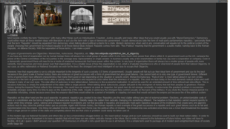
>>228897
This.
Democracy was invented in Greece by upperclass, slave-owning, white men who had to have prior military service to vote. They voted on classical-era issues at a time where governing was much simpler.
Conceptually, it wasn't engineered to accommodate the entire populous in elections.
This.
Democracy was invented in Greece by upperclass, slave-owning, white men who had to have prior military service to vote. They voted on classical-era issues at a time where governing was much simpler.
Conceptually, it wasn't engineered to accommodate the entire populous in elections.
It's quite simple.
Money isn't free, but voting is free.
All people have to do is vote for free money.
Liberal Democracy is just Socialism pretending to be Fascism.
Read 'The Doctorine of Fascism' and mussolini go on to say that Fascism is True democracy.
In short, service guarantees citizenship.
If you want to vote, work for it.
Money isn't free, but voting is free.
All people have to do is vote for free money.
Liberal Democracy is just Socialism pretending to be Fascism.
Read 'The Doctorine of Fascism' and mussolini go on to say that Fascism is True democracy.
In short, service guarantees citizenship.
If you want to vote, work for it.
>>228897
Exactly. Nothing I said was new at all. That's how "democracy" started, it's a far cry from what people think it is today. You had to have a stake in the society to participate in its governance. That should happen again, but it won't.
>>228971
>service guarantees citizenship.
Funny thing is Heinlein was a commie.
Exactly. Nothing I said was new at all. That's how "democracy" started, it's a far cry from what people think it is today. You had to have a stake in the society to participate in its governance. That should happen again, but it won't.
>>228971
>service guarantees citizenship.
Funny thing is Heinlein was a commie.
>>228858
Democracy is terrible at building and maintaining long term prosperity and stability because the number of people in the system looking at the horizon are far outnumbered by the people looking at their feet. It's a feelgood system, it's what happens when a group has seen to its security and prosperity and begins to look for ideals, which inevitably causes a collapse and subsequent loss of that security and prosperity. Of course, as a species we don't think too far ahead and we're not very good at learning our lessons, so we just keep doing it over and over.
Like communism, or a drunken teenager behind the wheel of a car.
Democracy is terrible at building and maintaining long term prosperity and stability because the number of people in the system looking at the horizon are far outnumbered by the people looking at their feet. It's a feelgood system, it's what happens when a group has seen to its security and prosperity and begins to look for ideals, which inevitably causes a collapse and subsequent loss of that security and prosperity. Of course, as a species we don't think too far ahead and we're not very good at learning our lessons, so we just keep doing it over and over.
Like communism, or a drunken teenager behind the wheel of a car.
>>228858
Democracy only works when groups of people with the same goals vote on issues that affect everyone equally.
Two friend groups can have their own democratic vote on what to pool their money for and order tonight.
Get two wildly different friend groups together and suddenly everyone's forced to foot the bill for absurdly expensive takeaway the bigger friend group loves.
Democracy certainly doesn't work when your friend groups are vastly outnumbered by barbarian hordes who want you enslaved and raped.
Democracy only works when groups of people with the same goals vote on issues that affect everyone equally.
Two friend groups can have their own democratic vote on what to pool their money for and order tonight.
Get two wildly different friend groups together and suddenly everyone's forced to foot the bill for absurdly expensive takeaway the bigger friend group loves.
Democracy certainly doesn't work when your friend groups are vastly outnumbered by barbarian hordes who want you enslaved and raped.
>>229032
>because the number of people in the system looking at the horizon are far outnumbered by the people looking at their feet
...when you let everyone vote. There must be a screening process.
>because the number of people in the system looking at the horizon are far outnumbered by the people looking at their feet
...when you let everyone vote. There must be a screening process.
>>228858
People don't like a system that boils down to "majority rules", especially when the majority lives thousands of miles away on the other side of the continent.
People don't like a system that boils down to "majority rules", especially when the majority lives thousands of miles away on the other side of the continent.
>>229323
I hear there was once a time when only white property-owning American men could vote in American elections.
I hear there was once a time when only white property-owning American men could vote in American elections.
>>229915
Incorrect. There was a time when only property owners could vote. There was the odd occasion where that involved a woman or a nigger, but overwhelmingly (cuz Europe before mass migration) they where whites or (((whites)))
Incorrect. There was a time when only property owners could vote. There was the odd occasion where that involved a woman or a nigger, but overwhelmingly (cuz Europe before mass migration) they where whites or (((whites)))
Tucker Carlson from Fox News often defends the idea of "American democracy", but he has stated before that there must also be a heirarchy to keep things in order.
I recently began to notice this genius strategy, instead of abolishing the idea of democracy, we should try to redefine it as a marketplace of ideas governed by freespeech, rather than just throwing a checkmark in a ballot box and changing the system through votes. As common sense would tell anyone, freespeech alone is more effective at changing the system than the type of democracy most preached by people today. Of course that type of democracy is really just a billion dollar press telling people how to think and act.
As the old saying goes, reality has a liberal bias. "Democracy" as defined today is actually just an illusion of power for the poor. Let the shitlibs have their illusion of "democracy" and we'll use "democracy" to our advantage.
I recently began to notice this genius strategy, instead of abolishing the idea of democracy, we should try to redefine it as a marketplace of ideas governed by freespeech, rather than just throwing a checkmark in a ballot box and changing the system through votes. As common sense would tell anyone, freespeech alone is more effective at changing the system than the type of democracy most preached by people today. Of course that type of democracy is really just a billion dollar press telling people how to think and act.
As the old saying goes, reality has a liberal bias. "Democracy" as defined today is actually just an illusion of power for the poor. Let the shitlibs have their illusion of "democracy" and we'll use "democracy" to our advantage.
>>228858
Democracy as in "The people vote on all matters and have the absolute say" is in itself corrupt. Absolute power corrupts absolutely.
It tries to level the playing field where power is shared horizontally and in essence is communism. The funny thing here is that it doesn't stand for anything and is volatile. When ever some one is is a bad mood they can rally the masses for their cause and make rash decisions where the culture in itself is changed. There is no permanence because what ever is the new fad, is what is voted on. This is what kills values and traditions. It is also what divides the nation.
Democracy fears anyone with power, anyone with leadership, any one that will try to guide them, anyone that will say NO.
It doesn't take anyone to look far and see how democracy can be scaled either large or small. Where even in the smallest of scales it can be used to accuse a military leader of war crimes because he criticized them and called them cowards. So they plot against him, try to get him removed. They tried to "vote" him off the island. This should be a great warning to the real world and what Democracy stands for.
And in other social circles this bullshit happens all the time. From online Social Media, Video Games, School Yards, even in a Starbucks. Don't like that police officers came in to get a coffee? VOTE THEM OUT. Don't like Suzie on the cheerleader squad because Josh likes her over your ugly ass? VOTE HER OUT. Don't like conservatives on your social media platform? VOTE THEM OUT.
When the people have absolute power it becomes tribalism, either you are for or against the popular idea and if yours isn't popular then you are removed. You may think, "But everything will always work out and dumb ideas like communism will never take hold because it isn't the popular idea." And that is where you fail.
Fail to see how ideas form, spread, and take hold. How propaganda is used to rally the masses and how stupid people really are that they are gullible to be feed what ever you tell them. They are a small group but they are loud and so anyone else is silenced, hunted, and removed.
Thank God we don't have a true democratic system but it sure is moving that way.
Democracy as in "The people vote on all matters and have the absolute say" is in itself corrupt. Absolute power corrupts absolutely.
It tries to level the playing field where power is shared horizontally and in essence is communism. The funny thing here is that it doesn't stand for anything and is volatile. When ever some one is is a bad mood they can rally the masses for their cause and make rash decisions where the culture in itself is changed. There is no permanence because what ever is the new fad, is what is voted on. This is what kills values and traditions. It is also what divides the nation.
Democracy fears anyone with power, anyone with leadership, any one that will try to guide them, anyone that will say NO.
It doesn't take anyone to look far and see how democracy can be scaled either large or small. Where even in the smallest of scales it can be used to accuse a military leader of war crimes because he criticized them and called them cowards. So they plot against him, try to get him removed. They tried to "vote" him off the island. This should be a great warning to the real world and what Democracy stands for.
And in other social circles this bullshit happens all the time. From online Social Media, Video Games, School Yards, even in a Starbucks. Don't like that police officers came in to get a coffee? VOTE THEM OUT. Don't like Suzie on the cheerleader squad because Josh likes her over your ugly ass? VOTE HER OUT. Don't like conservatives on your social media platform? VOTE THEM OUT.
When the people have absolute power it becomes tribalism, either you are for or against the popular idea and if yours isn't popular then you are removed. You may think, "But everything will always work out and dumb ideas like communism will never take hold because it isn't the popular idea." And that is where you fail.
Fail to see how ideas form, spread, and take hold. How propaganda is used to rally the masses and how stupid people really are that they are gullible to be feed what ever you tell them. They are a small group but they are loud and so anyone else is silenced, hunted, and removed.
Thank God we don't have a true democratic system but it sure is moving that way.
>>228858
Democracy has little to nothing to do with freedom. Democracy is merely a soft variant of communism, and rarely throughout history has it ever proven to be otherwise.
Democracy has little to nothing to do with freedom. Democracy is merely a soft variant of communism, and rarely throughout history has it ever proven to be otherwise.
>>229925
>As the old saying goes, reality has a liberal bias.
No faggot, that's not an old saying. That's a shitlib recently invented saying to defend the kike owned media.
>As the old saying goes, reality has a liberal bias.
No faggot, that's not an old saying. That's a shitlib recently invented saying to defend the kike owned media.
>>230410
Ok retard, its not an old saying but it has an old connotation. Kikes have been selling shitlib ideas to the masses for a long time.
Ok retard, its not an old saying but it has an old connotation. Kikes have been selling shitlib ideas to the masses for a long time.
>>228858
Democracy is an illusion of choice and free will.
The oligarchs are the plantations' owners, the jews and associated golems are the overseers, and the zogbots are tasked to check any slaves' disagreement about the rules.
Democracy is an illusion of choice and free will.
The oligarchs are the plantations' owners, the jews and associated golems are the overseers, and the zogbots are tasked to check any slaves' disagreement about the rules.
26 replies | 14 files | 23 UUIDs | Archived

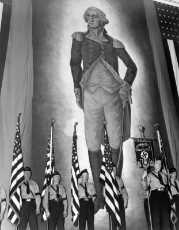
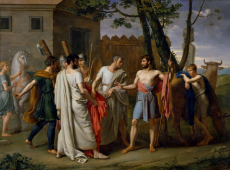
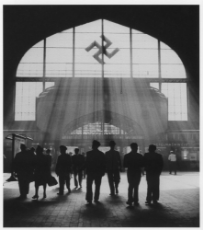
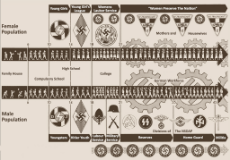
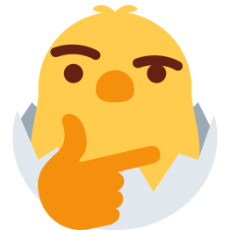
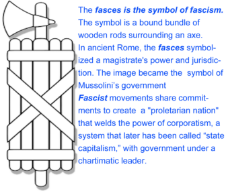
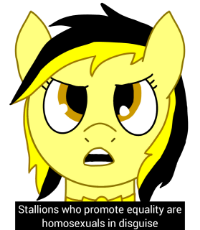



 Ex: Type :littlepip: to add Littlepip
Ex: Type :littlepip: to add Littlepip  Ex: Type :eqg-rarity: to add EqG Rarity
Ex: Type :eqg-rarity: to add EqG Rarity 